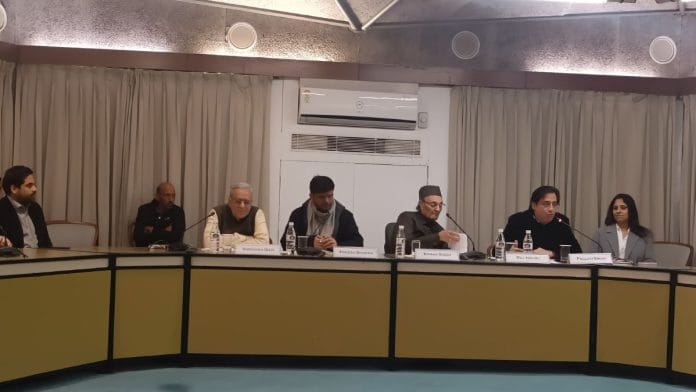New Delhi: All schools of Indian philosophy accept the Upanishads. But Kashmir Shaivism is an exception.
“Kashmir Shaivism is a very distinct portion of Hindu philosophy. It cannot be linked with the others as it has its own Shastras,” said renowned Vedanta philosopher and former Congress leader Karan Singh at the launch of Raj Nehru’s book I am Shiva: The Power of My Consciousness at New Delhi’s India International Centre.
Raj Nehru’s book delves into the profound philosophy of Kashmir Shaivism. It connects ancient spiritual insights with contemporary science, offering practical pathways toward attaining universal consciousness.
Singh was joined by other authorities on Hindu philosophy: Virendra Qazi, Kashmir Shaivism expert and chairman of Lalleshwari International Trust, and Yogesh Sharma, associate Professor at the Kala Kosa Division of Indira Gandhi National Centre for the Arts. The event, held on a rainy Delhi evening recently, was fully packed with history and culture enthusiasts.
The book launch also paid tribute to former PM Manmohan Singh, who died on 26 December. Karan Singh recalled a time around 70 years ago, when he was Sadr-e-Riyasat of Jammu & Kashmir. He was visiting the Government College, Hoshiarpur to felicitate students when he met Manmohan Singh. “He was a topper there and I always joked with him saying that he may have got a lot of prizes from Cambridge and Harvard but I was the one who gave him his first prize.”
About Kashmir Shaivism, Karan Singh clarified that it was “not against” the Upanishads—it just didn’t follow them.
“This is the only school as far as I am aware, apart from the Charvakas, that does not accept the Upanishads as the ultimate truth,” he said. Singh, who has authored many books on Kashmir Shaivism, called Nehru’s work as the first on the subject written by a layman for laymen.
“Nehru’s book is very authentic and an excellent introduction to Kashmir Shaivism particularly for those who are not studying the whole thing professionally,” he added.
The book is inspired by and based on Pratibignya Hridayam, a great treatise on Kashmir Shaivism. Written by Acharya Kshemaraja, a disciple of the Kashmiri mystic and aesthetician Acharya Abhinavagupta, it talks about inner consciousness and knowing oneself.
“Pratibignya Hridayam has a special importance because it combines and gives synthesis of two important streams of Kashmir Shaivism – Pratibignya Darshan (doctrine of recognition) and Smagdhi Shastra (doctrine of vibration),” explained Virendra Qazi.
‘I am Shiva’
Raj Nehru, also the Vice-Chancellor of Shri Vishwakarma Skill University in Haryana, recalled how his search for ‘self’ led him to discover that every human being is Shiva.
But Karan Singh disagreed with the author.
“We can be a devotee of Shiva, can be a follower of Shiva, but how can we actually become Shiva?” he asked.
Also read:
‘Hinduism offers a whole menu’
Kashmir Shaivism insists on calling itself Advaita (non-dualistic), but it really isn’t, said Singh. The Advaita philosophy stresses that the individual isn’t different from Brahman (universe), the highest reality. Kashmir Shaivism is Dvaita (dualistic) in reality. “In Kashmir Shaivism, Shiva and Shakti both are there.”
Singh said people are obsessed with the term Advaita. “As if being Dvaita is some ghatiya (inferior) thing. I don’t agree,” he said. According to him, the Advaita philosophy, first propounded in the 8th century CE, is more popular because of its association with Vedic scholar and philosopher Adi Shankaracharya. There’s a prevailing sentiment that Shankaracharya’s thought is superior, which is why Kashmir Shaivism claims to follow his philosophy.
Singh reiterated that there are hundreds of paths in Hinduism.
“The only religion that gives us a whole menu is Hinduism. We can choose our way, it gives a choice of which path you want to follow and also accepts the other paths to the divine. There is no such religion in the world,” he said while quoting Rigveda’s famous statement: Ekam sat viprah bahudha vadanti (Truth is one, the wise call it by many names).
(Edited by Zoya Bhatti)






